#Yigal Allon
Explore tagged Tumblr posts
Text
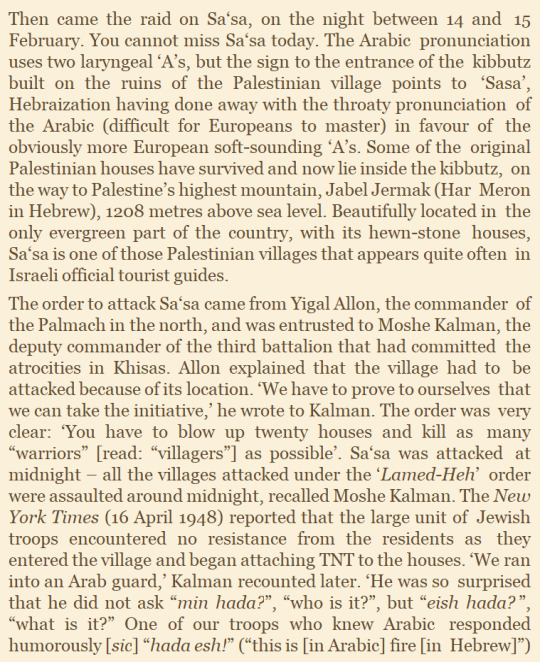

The Ethnic Cleansing of Palestine - Ilan Pappé (2006)
#Sa'sa#kibbutz#Jabel Jermak Har Meron#Yigal Allon#Palmach#Moshe Kalman#1948#Britain#Safad hospital#Sasa#The Ethnic Cleansing of Palestine#Ilan Pappé#Ilan Pappe#Palestine#Palestinians#free palestine#israel#zionism#nsnv#cw death#cw violence#ideology#nonfiction#colonialism#atypicalreads#ethnic cleansing#politics#history#state of israel
25 notes
·
View notes
Text
Israel is a nation founded on and sustained by settler-colonial violence, whether the Haganah and Irgun militias in 1948 or their descendants, the Israeli Defense Forces, Mossad, and Shin Bet. Without the massacres, without the trails of tears leading to Gaza, Lebanon, Syria, the West Bank, Egypt, and Jordan, Israel would not exist. Settler violence in the name of Jewish supremacy is both Zionism’s original sin and its operative logic. From the left flank of Zionism (represented by figures like Yigal Allon, leader of the Israeli Labor Party) to the right (like Menachem Begin, commander of the Irgun Militia and future Likud Prime Minister), the founders of Israel were united in their designs on historic Palestine and beyond. Chaim Weizmann, the first president of Israel, declared in 1937, “We shall spread in the whole country in the course of time . . . [the partition] is only an arrangement for the next twenty-five to thirty years.” The dreams of early Zionist leaders live on in the settlers who terrorize Palestinians in the West Bank and push their settlements ever-deeper into what they call Judea and Samaria, or the “Land of Israel.” To today’s liberal Zionists, this is a deeply inconvenient historiography. After all, the Zionist colonization of the West Bank is widely condemned, and the International Court of Justice recently found that Israel’s fifty-seven-year-long occupation and settlement of the West Bank is illegal under international law. For decades, liberal Zionist writers have attempted to portray the West Bank settlers and their benefactors as the bastardization of a sacred ideal, rather than what they more truthfully represent: the bare, exposed soul of Zionist settler colonialism, without reservation, without media training, without hasbara; pure, unadulterated violence, biblical racism, greed, and theft. The settlers are, if nothing else, remarkably honest about the nature of the Zionist project. By cordoning them off as aberrations to be rebuked, the intent of liberal Zionist commentators is to reclaim the legitimacy of Israel via controlled demolition. This manifests in what the academic Kerry Sinahan recently described as “critical counter-insurgency,” a mode of commentary and reporting which is designed to “to rescue Zionism, rather than Palestinians, from the rubble of Israeli destruction.” Counterinsurgent critique is a means of controlling the narrative and constricting the spectrum of political possibilities. If the Zionists themselves set the parameters for acceptable criticism of Israel, they can ensure it serves their interest—and that it doesn’t go too far, to the rational end point of anti-colonial resistance.
3 September 2024
283 notes
·
View notes
Text
I Support A 2 State Solution

I support the 2 state solution:
Palestinians get Palestine, and israelis return to their original countries.
Every single Israeli prime minister is from Eastern Europe.
They have no connection to Palestine whatsoever.
David Ben-Gurion – Poland
Moshe Sharett – Russian Empire
Levi Eshkol – Russian Empire
Yigal Allon – Belarus
Golda Meir – Ukraine
Yitzhak Rabin – Eastern European
Yitzhak Shamir – Poland / Belarus
Shimon Peres – Poland
Benjamin Netanyahu – Poland
Ehud Barak – Lithuania
Ariel Sharon – Georgia
Ehud Olmert – Ukraine/ Russia
Naftali Bennett – America / Europe
Yair Lapid – Serbia / Hungary
Israelis are white European colonizers who came to Palestine to steal land and use religion as an excuse.
The US and UK support them so they keep the Arab world in chaos (divide and conquer) and have an illegal military outpost on someone else’s land.
Richard Medhurst
Image: “The Germans Destroyed Our Families and Homes. Don’t You Destroy Our Hopes.”
#palestine#gaza#palestinians#free palestine#islamophobia#islam#israel#photography#free gaza#gaza strip#gaza genocide#gazaunderattack#palestine genocide#genocide#gaza under attack#gaza news#gaza war#gazan genocide#gaza now#gazan families#gazan amputees are delivering aid to children by bike during the israel hamas war#nakba#nakba 2023#al nakba#second nakba#nakba 1948#cultural genocide#apartheid#state terrorism#Hamas
133 notes
·
View notes
Text

An 1,800 year old oil lamp with a seven-branch menorah found in Usha along the Sanhedrin Trail, Israel. Displayed in the Yigal Allon Center. Photo by Yaniv Berman/Israel Antiquities Authority.
#antiquity#ancient artifact#artifacts#oil lamp#menorah#jewish archeology#archeology#jewish history#jewish heritage#israel archeology#eretz israel#Mediterranean#uploads
25 notes
·
View notes
Text
"The crisis reached its peak during a meeting of the War Cabinet on October 7 at 2:50 PM. This meeting marked the lowest point for Israel's leadership during the war and revealed how much the military situation had worsened. The discussion centered on a report from Dayan, who had just returned from inspecting the frontlines and was deeply worried. His words created a somber mood, as he warned that there was a serious threat to the country's existence: 'They came to fight for the Land of Israel... to conquer Israel and destroy the Jews.' Yigal Allon agreed with Dayan's assessment of the Arab's intentions. Prime Minister Meir added, 'There's no reason for them to stop—not just now. They've had a taste of blood... This is the second round since 1948.'" (Tsobef, 2018; 54)

Versión traducida al castellano: "La crisis alcanzó su punto máximo durante una reunión del Gabinete de Guerra el 7 de octubre a las 2:50 PM. Esta reunión marcó el punto más bajo para el liderazgo de Israel durante la guerra y reveló cuánto había empeorado la situación militar. La discusión se centró en un informe de Dayan, quien acababa de regresar de inspeccionar las líneas del frente y estaba profundamente preocupado. Sus palabras crearon un ambiente sombrío, ya que advirtió que había una amenaza seria para la existencia del país: 'Vinieron a luchar por la Tierra de Israel... a conquistar Israel y destruir a los judíos.' Yigal Allon estuvo de acuerdo con la evaluación de Dayan sobre las intenciones de los árabes. La Primera Ministra Meir agregó, 'No hay razón para que se detengan—no solo ahora. Han probado sangre... Esta es la segunda ronda desde 1948.'" (Tsobef, 2018; 54)
Hagai Tsoref. “Golda Meir’s Leadership in the Yom Kippur War.” Israel Studies, vol. 23, no. 1, 2018, pp. 50–72. JSTOR, https://doi.org/10.2979/israelstudies.23.1.03. Accessed 10 May 2024.
#judaísmo#judaism#judío#jewish#israel#october 7#7 de octubre#7 october#7 de outubro#tierra de israel#🇮🇱#jews#jewish people#judíos#matanza#yom kippur war#yom kipur#yom kippur#egypt#🇪🇬#siria#syria#🇸🇾#jew
15 notes
·
View notes
Text





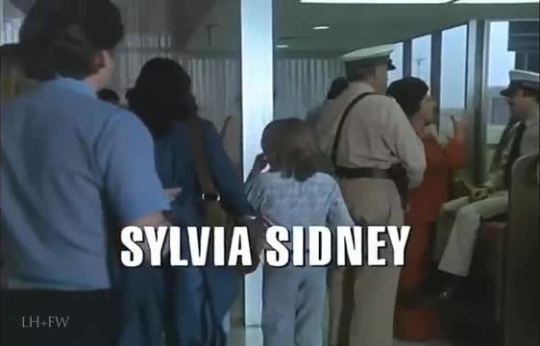

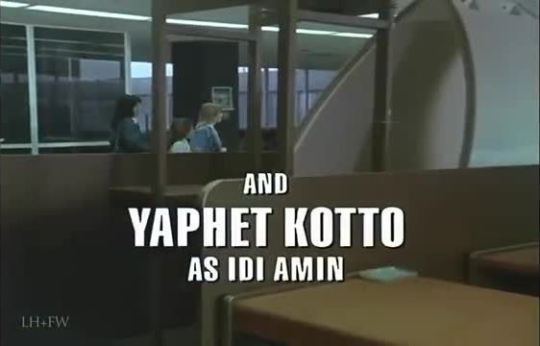




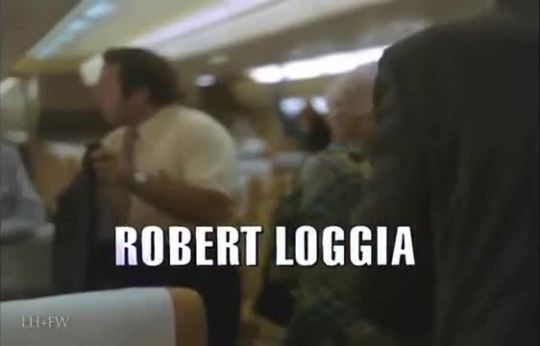

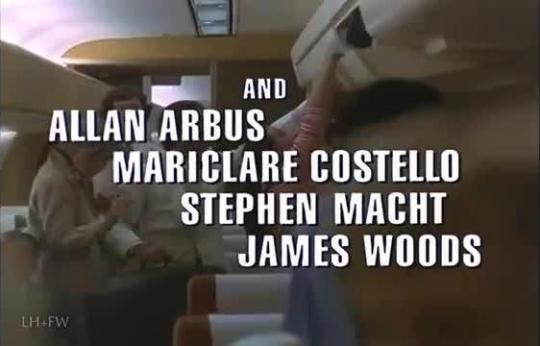
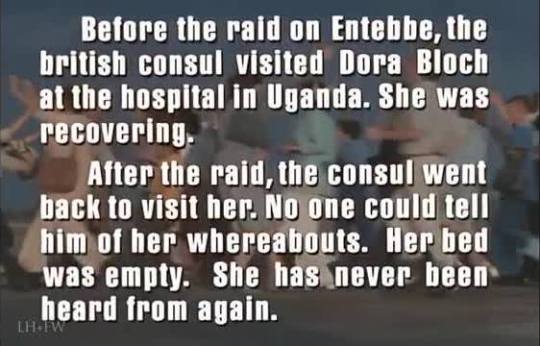
Raid on Entebbe - NBC - January 9, 1977
Historical Drama
Running Time: 150 minutes
Stars:
Peter Finch as Yitzhak Rabin
Charles Bronson as Brigadier General Dan Shomron
Yaphet Kotto as Idi Amin
Martin Balsam as Daniel Cooper
Horst Buchholz as Wilfried Böse
John Saxon as Major General Benny Peled
Jack Warden as Lieutenant General Mordechai Gur
Meshach Richards as Major General Allon
Sylvia Sidney as Dora Bloch
Robert Loggia as Yigal Allon
Tige Andrews as Shimon Peres
Eddie Constantine as Captain Michel Bacos
Warren Kemmerling as Gad Ja'akobi
David Opatoshu as Menachem Begin
Allan Arbus as Eli Melnick
Stephen Macht as Lieutenant Colonel Yonatan "Yoni" Netanyahu
James Woods as Captain Sammy Berg
Harvey Lembeck as Mr. Harvey
Dinah Manoff as Rachel Sager
Kim Richards as Alice
Aharon Ipal�� as Major David Grut
Mariclare Costello as Gabrielle Krieger
Larry Gelman as Mr. Berg
After the Uganda–Tanzania War, Tanzanian troops discovered Bloch's body in 1979 in a sugar plantation around 20 miles (32 km) from Kampala, near the Jinja Road. Visual identification was impossible because her face was badly burned, but the corpse showed signs of a leg ulcer. A pathologist working with the Israel Defense Forces formally identified Bloch from the remains. Her remains were returned to her son in Israel, where she was given an Israeli state funeral. She was buried in Jerusalem's Har HaMenuchot Cemetery. (Wikipedia)
21 notes
·
View notes
Text
(JTA) — Shlomo Avineri, a leading Israeli political philosopher, left-leaning former director-general of the country’s foreign ministry and clear-eyed critic of both sides to the Israeli-Palestinian conflict, died on Friday. He was 90.
Avineri was a longtime professor of political science at Hebrew University, where he produced important scholarship on Zionist thinkers Theodor Herzl and Moses Hess as well as the works of Karl Marx and G.W.F. Hegel. He applied his historical perspective as a frequent commentator in the Israeli and foreign media, and as a regular columnist for the Israeli daily Haaretz.
In 1975, the government of Prime Minister Yitzhak Rabin appointed him as director-general of the foreign ministry, then headed by Yigal Allon. The right-wing Likud party, then in opposition, bitterly opposed the appointment of Avineri, who in 1971 edited a book that explored the possibility of negotiations with the Palestine Liberation Organization when such talks were still illegal. When Likud took office in 1977 with the election of Menachem Begin, Avineri submitted his resignation.
At the time, many in Israel thought Avineri would lead a dovish challenge to the humbled Labor party. “During his one year tenure at the Foreign Ministry he became a familiar face on Israeli television, to such a degree that aides to Allon complained that Avineri was upstaging his boss,” the Jewish Telegraphic Agency reported in 1977.
Nevertheless, he returned to teaching at Hebrew University. He headed the political science department and devoted himself to researching the intellectual origins of Zionism.
Even while producing more than a dozen books on 19th-century political thought, Avineri remained deeply engaged with current events in Israel. In a 2011 article for Haaretz, he urged Israelis to understand the Palestinian perspective, but also criticized the Palestinian leadership for denying essential facts about the founding of Israel.
The 1948 war should “not be taught as a battle between narratives. In the final analysis, there is a historical truth,” he wrote. “And without ignoring the suffering of the other, that is how such sensitive issues must be taught.”
Avineri was born Jerzy Wiener in Bielsko, Poland, in 1933. His family arrived in then-Palestine in 1939 and settled in Herzliya. He studied political science and history at the Hebrew University of Jerusalem, where he received his doctorate.
As a visiting scholar he held appointments at Yale, Cornell, the Cardozo School of Law in New York and Northwestern University, among others. He was also a visiting scholar at the Wilson Center, the Brookings Institution and the Carnegie Endowment for International Peace.
After the fall of the Soviet Union, he advised Eastern European nations about democratization, and in 1989 he served as an observer to the elections in Hungary and Czechoslovakia.
Avineri was awarded the Rubin Prize in 1969 for his research, the Naftali Prize in 1971 and the Present Tense Award from the American Jewish Committee in 1982. In 1996 he received the Israel Prize, the country’s highest honor, for political science.
Avineri is survived by his daughter Maayan. His wife Devora (Nadler) Avineri died in 2022.
6 notes
·
View notes
Text
CE 1967: Allon plan
Named after Yigal Allon, the then minister of labour. Its main objective was to ensure “Jewish presence” and avoid annexing areas densely populated by Palestinians.
View On WordPress
0 notes
Text
[Palmach head Yitzhak Sadeh’s] second in command, Yigal Allon, was even more critical. He criticised the Consultancy indirectly for not having issued explicit orders for a comprehensive attack at the beginning of December. ‘We could have taken Jaffa by now easily and should have attacked the villages around Tel-Aviv. We have to go for a series of “collective punishments” even if there are children living in the [attacked] houses’.
—Ilan Pappé, from The Ethnic Cleansing of Palestine
0 notes
Link
All time Israeli Prime Minister List is now available online, checkout the names of PM of Israel since 1948. Fourteen people have served as prime minister of Israel, five of whom have served on two or three non-consecutive occasions. Additionally, one person, Yigal Allon, has served solely as an acting prime minister. The other two […]
0 notes
Photo


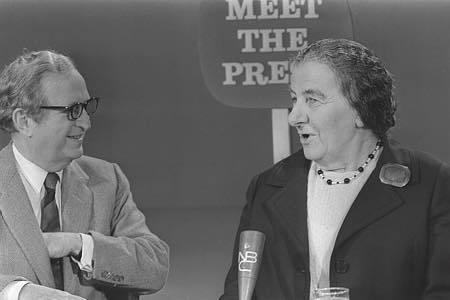
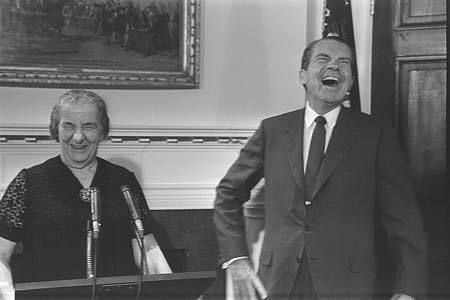

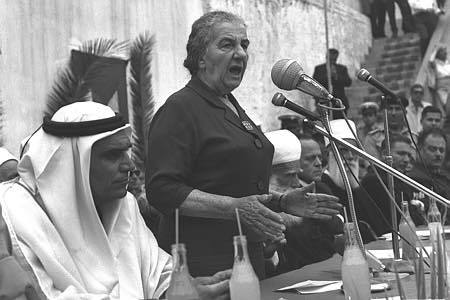

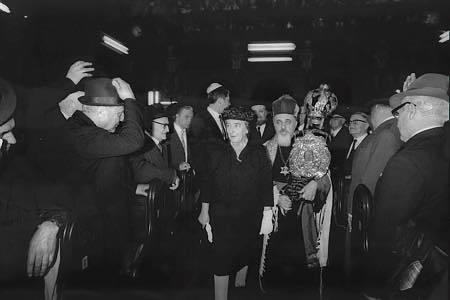
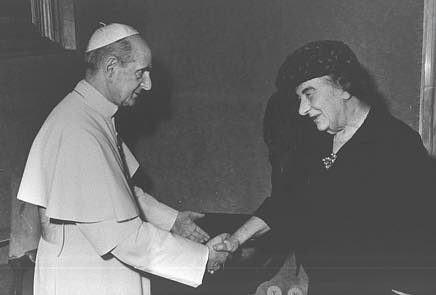
#OnThisDay Born Golda Mabowitz on May 3, 1898 in Kyiv, Ukraine. Golda Meir was a Zionist advocate, an Israeli politician who was amongst the founders of the State of Israel. She later served as the State's fourth prime minister - Israel's first and the world's third woman to have served in this post. Here is a collection of Golda snapshots through the years.
Photos:
1- Golda Meir is sworn in as the Prime Minister of Israel, 1969.
2- Children greeting Golda Meir on her arrival at Philadelphia Airport, 1969.
3- Golda Meir appears on NBC TV’s "Meet the Press" in Washington, 1969.
4- Golda Meir and President Nixon during their farewell meeting at the White House in Washington, 1969.
5- Golda Meir embracing one of the students at her old school, 4th Street Elementary during her visit to Milwaukee, 1969.
6- Golda Meir addressing members of Druze community and guests during the Nebi Shueib festival in Hittim, 1969.
7- Golda Meir flanked by Deputy PM Yigal Allon and the Chief of Protocol approaching the terminal at Lod Airport, 1970.
8- Chief Rabbi Moshe Rosen carrying a Torah leading Golda Meir into the Chorale Synagogue in Bucharest, Romania, 1972.
9- Pope Paul VI Receiving Golda Meir at The Vatican in Rome, 1973.
“We hate war. We do not rejoice in victories. We rejoice when a new kind of cotton is grown, and when strawberries bloom in Israel.” – Golda Meir
May her memory be a blessing
Photos: Government Press Office
Humans of Judaism
36 notes
·
View notes
Text
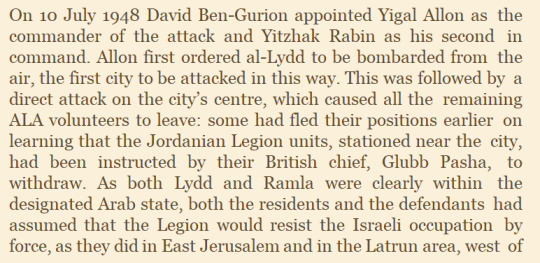

The Ethnic Cleansing of Palestine - Ilan Pappé (2006)
#Palestine#Israel#Free Palestine#Free Gaza#David Ben Gurion#Ben Gurion#Yigal Allon#Yitzhak Rabin#al-Lydd#ALA#Jordanian Legion#Glubb Pasha#Britain#Lydd#Ramla#Jerusalem#Legionaries#Dahamish Mosque#massacre#cw violence#cw death#West Bank#Nakba#The Ethnic Cleansing of Palestine#Ilan Pappé#ethnic cleansing#zionism#nsnv#colonialism
0 notes
Text
2 notes
·
View notes
Text
19th Prime Minster?
written by Will Schumaker
The 19th letter of the Hebrew alphabet is the letter “Quph”.
The ancient pictograph of the letter Quph is thought to represent the sun on the horizon. It is a horizontal line running through a circle. (Jeff Benner has an excellent site on the ancient pictographs of the Hebrew alphabet) The sun on the horizon would represent a cycle of time.
I have a post on this site about the number 19 and it would be helpful to read that. It seems that the number 19 represents the closing of a cycle of time.
The destruction of Jerusalem and the temple in 587bc is tied to the number 19. It was the 19th year of the king of Babylon.
Jeremiah 52:12 Now in the fifth month, in the tenth day of the month, which was the nineteenth year of Nebuchadrezzar king of Babylon, came Nebuzaradan, captain of the guard, which served the king of Babylon, into Jerusalem,
Jeremiah 52:13 And burned the house of the LORD, and the king's house; and all the houses of Jerusalem, and all the houses of the great men, burned he with fire:
As I posted about chapter 19 of the Bible is about the destruction of Sodom and Gommorah, a picture of the end of time when Christ returns.
At the end of King Solomon’s reign the 12 tribes were split into the northern and southern kingdom. The northern kingdom which is the house of Ephraim/Joseph had 19 kings before Assyria conquered it. The southern kingdom which is the house of Judah also had 19 kings before Babylon destroyed it. (They did have 1 queen also.) So 19 again tied to the consummation of a cycle of time.
Here is a real easy to read table of the 19 kings of the northern kingdom and the 19 kings and 1 queen of the southern kingdom: https://jesusalive.cc/kings-israel-judah/
Also note that the first siege of Babylon against Jerusalem happened during the 19th ruler (18 king 1 queen) of Israel. Jehoiachin, the 19th ruler, was taken captive to Babylon, and Babylon put in place Zedekiah as its own choice for king.
So this number of 19 rulers of Israel before its destruction both of the northern and southern kingdoms has always intrigued me. God repeats patterns over and over.
Right now Israel is possibly looking for its 19th ruler. Benjamin Netanyahu could not form a government and now Yair Lapid is tasked with trying to form the government.
Here is a nice list of prime ministers of Israel: https://en.wikipedia.org/wiki/List_of_prime_ministers_of_Israel
Note that one prime minister was an acting prime minister, that was Yigal Allon. Also 5 men have been prime ministers then lost their position and then regained it.
1) David Ben-Gurion 2) Moshe Sharett 3) David Ben-Gurion 4) Levi Eshkol 5) Yigal Allon 6) Golda Meir 7) Yitzhak Rabin 8) Menachem Begin 9) Yitzhak Shamir 10) Shimon Peres 11) Yitzhak Shamir 12) Yitzhak Rabin 13) Shimon Peres 14) Benjamin Netanyahu 15) Ehud Barak 16) Ariel Sharon 17) Ehud Olmert 18) Benjamin Netanyahu
Something else to keep in mind as far as typology - Israel is God’s chosen people. The Church is God’s chosen people. The temple is a type of Christ indwelling God’s chosen people. New Jerusalem is a type of the Church.
So the destruction of the northern kingdom of Israel, the destruction of the temple and Jerusalem, and the destruction of the harlot church, mystery Babylon, are all a type of the same thing. The saving of Lot and the destruction of Lot’s wife are a type of the saving of God’s true Bride and the destruction of the harlot.
Recall God says that judgement begins at the house of God:
1 Peter 4:17 For the time is come that judgment must begin at the house of God: and if it first begin at us, what shall the end be of them that obey not the gospel of God?
Israel is looked upon as a sort of timeclock as to the endtimes, so seeing the pattern of 19 being repeated again with Israel is of interest.
#Will Schumaker#Bible prophecy#Israel#Northern Kingdom#Southern Kingdom#Babylon#Endtimes#Bible numbers#19th prime minister#Christ Bride#Hebrew Alphabet#Hebrew pictographs
3 notes
·
View notes
Text
L’omicidio come politica dello Stato israeliano
“Se i nostri sogni per il sionismo non devono finire nel fumo delle pistole degli assassini e il nostro lavoro per il suo futuro non dev’essere atto a produrre solo una nuova serie di delinquenti degni della Germania nazista, molte persone come me dovranno riconsiderare la posizione che, in passato, hanno mantenuto per tanto tempo”.
– Winston Churchill, novembre 1944, dal suo discorso alla Camera dei Comuni sull’assassinio da parte di due membri dell’organizzazione terroristica sionista Lehi del ministro residente del Regno Unito Lord Moyne in Medio Oriente.
Tra i crimini di Israele contro l’Iran negli ultimi dieci anni si annoverano il sabotaggio delle centrifughe del programma di sviluppo nucleare utilizzando il virus Stuxnet, l’uccisione tramite attacco missilistico dei membri della sua milizia in Siria, il sabotaggio della centrale nucleare di Natanz nel luglio di quest’anno e l’omicidio, negli ultimi anni, di cinque dei suoi principali scienziati nucleari. L’uccisione più recente, avvenuta negli ultimi giorni, è quella dello scienziato Mohsen Fakhrizadeh.
Tutti questi attacchi sarebbero stati effettuati con almeno l’approvazione del governo degli Stati Uniti, se non con un certo coinvolgimento attivo sia degli Stati Uniti che dell’organizzazione terroristica iraniana da loro controllata, il MEK (Mujahedin e-Khalq). Al contrario, Israele sarebbe stato strettamente coinvolto nell’assassinio da parte degli Stati Uniti di Qasim Suleimani in Iraq nel gennaio di quest’anno.
Questi omicidi saranno anche operazioni di stato, ma non differiscono per sfacciataggine, illegalità e brutalità dai colpi organizzati dalle bande mafiose. Mohsen Fakhrizadeh, un illustre fisico, è stato apparentemente prelevato dalla sua auto durante l’attacco, trascinato in mezzo alla strada e ucciso. Un crimine tanto atroce che persino le voci solitamente ostili all’Iran (incluso il New York Times e l’ex direttore della CIA John Brennan) sono rimaste inorridite.
Ciascuno di questi attacchi sarebbe sufficiente a costituire il casus belli per una guerra. È un gioco a cui si può giocare in due: con questi attacchi, Israele sta virtualmente invitando all’assassinio dei suoi stessi leader politici e comandanti militari o dei suoi alti rappresentanti all’estero. Allo stesso modo, il fatto che non contrattacchi, non significa necessariamente che l’Iran non abbia la capacità di organizzare simili ritorsioni. A parte la criminalità e le violazioni del diritto internazionale rappresentate da tali azioni, l’Iran non risponderà mai in un momento scelto da Israele.
Tuttavia, il governo è messo sotto pressione del suo stesso popolo per l’affronto di un devastante contraccolpo, non necessariamente contro singoli individui, contro le infrastrutture israeliane come il porto di Haifa. Ciascuna di queste provocazioni spinge l’Iran più vicino al limite, proprio come voleva Israele. Il ripetuto rifiuto da parte del governo di rispondere agli attacchi viene percepito in Iran come un segno di debolezza, poiché più Israele la fa franca, più in là si spingerà in futuro.
Allo stesso tempo, anche se Israele è responsabile, una rappresaglia iraniana innescherebbe una risposta militare su larga scala da parte di Israele e una guerra di violenza inaudita che nessuno sano di mente vorrebbe combattere. Ulteriore segno del vuoto morale che li contraddistingue è che Netanyahu e molti dei fanatici che lo seguono vogliono una guerra del genere e sono pronti a sganciare bombe su reattori nucleari attivi per raggiungere i loro obiettivi.
L’opinione generale sembra essere che Israele abbia fatto tutto questo per impedire a Biden di firmare nuovamente l’accordo nucleare del Piano d’azione globale congiunto (JCPOA) dal quale Trump ha ritirato gli Stati Uniti nel 2018. Potrebbe essere così, ma Netanyahu potrebbe anche aver calcolato che quest’ultimo atto barbarico avrebbe costituito la scintilla che avrebbe acceso la guerra che desiderava da anni. Entrambe le cose l’avrebbero soddisfatto.
I paralleli nella storia non mancano. Per quanto riguarda i tentativi di Israele di far scoppiare una guerra aperta con l’Iran, un parallelo sarebbe la manovra israeliana per trascinare in guerra il presidente egiziano Gamal Abd al Nasser nel 1967. Questa non era una guerra “preventiva”, ma un’altra guerra decisa a tavolino. Infatti, prima della guerra del 1967 ci fu quella del 1948, fatta scoppiare dai sionisti perché era l’unico modo che avevano di conquistare la Palestina, o almeno la maggior parte di essa. L’obiettivo di quella del 1967 era, invece, distruggere le forze armate egiziane, per poi annientare la leadership mondiale di Nasser nel mondo arabo e successivamente occupare il resto della Palestina.
Ebbe un successo sorprendente: tutta la Palestina finì sotto occupazione e l’esercito egiziano fu distrutto. La leadership panaraba di Nasser non fu distrutta, bensì gravemente indebolita dall’incapacità dell’Egitto di vedere la guerra arrivare e difendersi.
Proprio come Israele ha cercato di attirare l’Iran allo scoperto attraverso l’assassinio dei suoi scienziati e il sabotaggio delle sue centrali nucleari, così nell’anno prima della guerra del 1967 decise di portare Nasser allo scoperto attraverso provocazioni lungo la linea dell’armistizio siriano. Queste provocazioni presero la forma di incursioni con trattori corazzati nella ZDC, innescando bombardamenti da parte dell’esercito siriano e poi attacchi aerei da parte di Israele.
Sebbene Israele fosse determinato a distruggere qualsiasi governo nazionalista arabo e lo stesso nazionalismo arabo, l’obiettivo principale di queste provocazioni era Nasser. Era il più grande campione arabo e Israele voleva metterlo in una posizione dove avrebbe potuto attaccarlo. Sapeva che prima o avrebbe dovuto rispondere alle sue provocazioni sul fronte siriano intervenendo sul fronte egiziano.
Quando Israele abbatté sei aerei siriani, nell’aprile 1967, le acque iniziarono a muoversi. I politici israeliani parlarono di spingersi a un punto mai visto prima, di dare una lezione e persino di invadere la Siria e occupare Damasco 15 anni prima della sua invasione del Libano e dell’occupazione di Beirut.
Entro la seconda settimana di maggio, la guerra era considerata inevitabile. Nasser spostò truppe e carri armati nel Sinai e chiese il ritiro della Forza di emergenza delle Nazioni Unite (UNEF) dalla linea dell’armistizio. Sebbene Israele fosse l’aggressore della guerra del 1956, le forze dell’UNEF erano all’interno dell’Egitto perché Israele si rifiutava di accettarle dalla sua parte della linea dell’armistizio e, come al solito, ottenne ciò che voleva.
Il 22 maggio, Nasser chiuse lo Stretto di Tiran, il punto di ingresso al Golfo di Aqaba, ma senza bloccarlo effettivamente al trasporto israeliano. Sotto pressione, tuttavia, per resistere agli israeliani, aveva spostato l’ultimo pezzo sulla scacchiera che aveva preparato il terreno per la guerra.
Israele ripeté la retorica del 1948. Era di nuovo minacciato di sterminio e annientamento per mano di un “anello d’acciaio” arabo. In effetti, sapeva, e così sapeva anche la CIA, che avrebbe sconfitto facilmente qualsiasi esercito o combinazione di eserciti arabi. Dato il panico deliberatamente scatenato tra la popolazione israeliana, i generali non vedevano l’ora di partire. Avevano promesso di essere sulle rive del Canale di Suez entro una settimana. Questa era un’opportunità che loro stessi avevano creato e che Israele non poteva permettersi di perdere. L’esercito avrebbe sferrato un colpo da KO: secondo Yigal Allon, “Non c’è il minimo dubbio sull’esito di questa guerra e su ciascuna delle sue fasi”.
E così è stato. Dalla parte araba, non c’è il minimo dubbio che Nasser non volesse la guerra. Le sue minacce erano quelle di un campione arabo e il suo pubblico era il mondo arabo, ma dietro le quinte cercava una via d’uscita dalla crisi in cui era stato incastrato. Una delegazione egiziana guidata dal vicepresidente Zakaria Muhi Al-Din sarebbe dovuta volare a Washington il 7 giugno per iniziare i colloqui per porre fine alla crisi il giorno successivo. Tuttavia, il 5 giugno, con l’opportunità per la guerra che stava per sfuggirgli, Israele ha attaccato.
C’è simmetria in tutte queste guerre: Israele interpreta il ruolo della vittima anche mentre si prepara ad attaccare. Nel 1948, Chaim Weizmann parlò di sterminio assicurando agli americani dietro le quinte che gli eserciti arabi non contavano nulla. L’arroganza israeliana fu frenata nella prima settimana della guerra del 1973, con l’umiliazione per mano di Hezbollah, che poi avvenne nel 2000 e nel 2006. Tuttavia, se c’è una curva di apprendimento, Israele non la vede. Un esempio di ciò che molto tempo fa il senatore statunitense J. William Fulbright chiamava “l’arroganza del potere”.
Israele applica sempre la stessa tattica su piccola e su larga scala: in Cisgiordania e Gaza uccide e massacra e poi, davanti a un’eventuale risposta palestinese, trova la sua motivazione logica per colpi più devastanti. In Cisgiordania, questo concetto di solito si trasforma in ampliamento o costruzione di nuovi insediamenti.
Dal punto di vista sionista, questo è stato un anno buono. A seguito dell’instaurazione di relazioni diplomatiche con Israele da parte degli Emirati Arabi Uniti e del Bahrein, i primi sono arrivati al punto di bloccare i visti d’ingresso ai cittadini di una decina di paesi musulmani e di consentire l’ingresso senza visto agli israeliani. I colloqui in Arabia Saudita tra Netanyahu e Muhammad bin Salman, apparentemente organizzati all’insaputa del re, aprono la strada all’instaurazione di relazioni diplomatiche, anche se per il momento ciò non è previsto. MbS può dare a Israele quasi tutto ciò che vuole senza bisogno di venire allo scoperto e, in qualità di custode nominale dei due luoghi santi, una tale mossa farebbe infuriare i musulmani di tutto il mondo, con possibili conseguenze esplosive al momento dell’hajj.
I progressi strategici di Israele includono anche la relazione commerciale, militare e strategica che sta stabilendo nel Mediterraneo orientale con la Grecia e il governo greco di Cipro meridionale, che ha già consentito alle unità militari israeliane di addestrarsi sull’isola a causa della somiglianza topografica con il Libano meridionale. Sfruttando con successo le paure dell’Iran nel Golfo, Israele sconfigge la rivalità greca con la Turchia nel Mediterraneo orientale.
Capace di attaccare dal centro delle terre arabe centrali, ovvero la Palestina occupata, Israele si sta spostando costantemente verso una posizione che, alla fine, gli consentirà di minacciare gli stati arabi e l’Iran dalla periferia, dal golfo a sud-ovest e dall’angolo nord-orientale del Mediterraneo. Ha spalancato tutte queste porte e, sulla base della somma dei suoi comportamenti passati, continuerà a spingere fino a ottenere ciò che vuole.
L’assassinio di Mohsen Fakhrizadeh ha antecedenti che risalgono agli omicidi con fuochi d’artificio nei mercati palestinesi negli anni ’30, all’assassinio di Lord Moyne al Cairo il 6 novembre 1944, all’esplosione del King David Hotel nel 1946, all’assassinio del conte Folke Bernadotte nel 1948 e ai massacri e distruzioni che da allora hanno segnato la presenza sionista in Medio Oriente.
Non importa che il nemico sia uno stato, un’organizzazione o un individuo: deve essere distrutto. Il rifiuto permanente della “comunità” internazionale di punire Israele per uno qualsiasi di questi crimini non fa che incoraggiare lo stato sionista a spingersi ancora oltre.
Parlando alla Camera dei Comuni dopo l’omicidio di Lord Moyne, Churchill, un forte sostenitore del sionismo da sempre, ha sottolineato: “Se ci deve essere la speranza di un futuro pacifico e di successo per il sionismo, queste attività malvagie devono cessare e coloro che ne sono responsabili devono essere eradicati completamente”. Queste attività malvagie non sono mai cessate, i responsabili non sono mai stati eradicati completamente, il fumo delle pistole degli assassini ora aleggia su un’intera regione e il sionismo ha prodotto generazioni di criminali pienamente degni della Germania nazista.
Nessuno stato può sopportare all’infinito le provocazioni di Israele. Iran e Hezbollah stanno giocando una lunga partita se paragonata alla voglia implacabile che Netanyahu ha di soddisfazione immediata, ma ad un certo punto si farà chiaro un limite a ciò che possono sopportare. Poi ci sarà la guerra, probabilmente la guerra più devastante nella storia moderna del Medio Oriente. Cosa dirà allora la “comunità” internazionale? Sarà troppo tardi per pentirsi di non aver fatto nulla per fermare Israele prima.
– Jeremy Salt ha insegnato per molti anni all’Università di Melbourne, alla Bosporus University di Istanbul e alla Bilkent University di Ankara, specializzandosi in storia moderna del Medio Oriente. Tra le sue recenti pubblicazioni c’è il suo libro del 2008, The Unmaking of the Middle East. A History of Western Disorder in Arab Lands (University of California Press). Ha contribuito con questo articolo a The Palestine Chronicle.
(Foto: lo scienziato iraniano Mohsen Fakhrizadeh. Immagine: cortese concessione di Al-Mayadeen).
Traduzione per InfoPal di Stefania Solivardi
1 note
·
View note
Photo
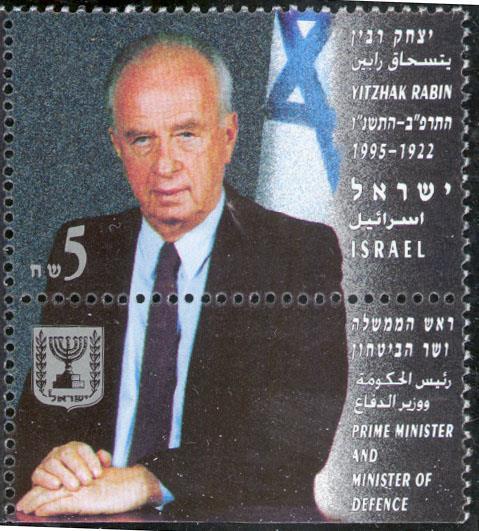
24 years since the assassination of Yitzhak Rabin
Yitzhak Rabin was born in Jerusalem in 1922 to pioneers from the Third Aliyah. As a youth he began to pursue a career in agronomy, but was persuaded by his friend Yigal Allon to forsake his studies and join the newly established Palmach. Shortly after, the 19-year-old sabra found himself at the head of the allied invasion of Lebanon under the command of Moshe Dayan. Yitzhak’s military prowess propelled him to the top of the Palmach command, where he stood out as one of the organization’s most distinguished members. In 1946 Yitzhak was arrested along with many other prominent Zionist leaders by the British during Operation Agatha and imprisoned for five months. In October 1947, he was appointed the Palmach’s Chief Operations Officer and went on to serve in many other critical roles throughout Israel’s War of Independence. Rabin’s military success culminated in his 1964 appointment as Chief of Staff, a position he held until 1968. During his tenure, the IDF achieved the miraculous victory of the Six Day War and established itself as the most dominant fighting force in the region. After retiring from the military, Rabin served as Israel’s ambassador to the US, during which the US became Israel's main weapons supplier. In 1973 Yitzhak entered politics and was appointed minister of labor in Golda Meir’s government; however, Golda resigned shortly after due to the public outcry following the Yom Kippur War. The Labor Party elected Rabin as its head and he was sworn in as Prime Minister, a position he held until 1977. After the 1984 elections that resulted in a national unity government, Rabin was appointed minister of defense and oversaw IDF military operations during the First Intifada. Rabin was elected Prime Minister for the second time in 1992 and signed the famous Oslo Accords with the PLO the following year (for which he was awarded the Nobel Peace Prize). In 1994 he signed a peace treaty with Jordan. On November 4, 1995, Yitzhak was assassinated by Yigal Amir, an extremist who opposed the Oslo Accords. In Israel, Yitzhak Rabin Memorial Day is commemorated on the Hebrew date of his assassination, the 12 of Cheshvan.
My Nation Lives עמי-חי
15 notes
·
View notes